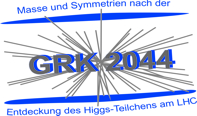Priority Programmes and Research Training Groups
Internationales Graduiertenkolleg "Dynamik kontrollierter atomarer und molekularer Systeme" (GRK 2717)
 UThe German Research Foundation (DFG) has approved new research training groups (GRK) with the goal of supporting young scientists. The funding will go specifically toward establishing the Research Training Group “Dynamics of Controlled Atomic and Molecular Systems (DynCAM)” at the Institute of Physics, University of Freiburg. The DFG will provide six million euros over four-and-one-half years toward the effort. Starting in January 2022, 14 doctoral researchers will be able to study matter at the quantum level in Freiburg and as part of an exchange program in Vancouver, Canada. Precisely controlled atomic and molecular samples, isolated for example in molecular beams, cluster beams, or special traps, play a key role in this research area, which focuses on understanding the dynamics of underlying processes. The new GRK at the University of Freiburg, in collaboration with the University of British Columbia (UBC) in Vancouver aims at studying and controlling electron and nuclear dynamics of systems in well-defined quantum states.
UThe German Research Foundation (DFG) has approved new research training groups (GRK) with the goal of supporting young scientists. The funding will go specifically toward establishing the Research Training Group “Dynamics of Controlled Atomic and Molecular Systems (DynCAM)” at the Institute of Physics, University of Freiburg. The DFG will provide six million euros over four-and-one-half years toward the effort. Starting in January 2022, 14 doctoral researchers will be able to study matter at the quantum level in Freiburg and as part of an exchange program in Vancouver, Canada. Precisely controlled atomic and molecular samples, isolated for example in molecular beams, cluster beams, or special traps, play a key role in this research area, which focuses on understanding the dynamics of underlying processes. The new GRK at the University of Freiburg, in collaboration with the University of British Columbia (UBC) in Vancouver aims at studying and controlling electron and nuclear dynamics of systems in well-defined quantum states.
(Spokesperson: Professor Dr. Frank Stienkemeier, Albert-Ludwigs-University Freiburg, Cooperation partner: University of British Columbia, Canada)
Research training Group "Mass and Symmetries after the Discovery of the Higgs Particle at the LHC" (GRK 2044)
(Spokesperson: Professor Dr. Markus Schumacher, Albert-Ludwigs-University Freiburg)
DFG Research Unit "Reducing complexity of nonequilibrium systems"
(FOR 5099)
Nonequilibrium processes are ubiquitous in basic research as well as technological applications. Nevertheless, the vast majority of theoretical modeling and simulation of complex systems is based on the assumption of thermodynamic equilibrium. The aim of the research unit (RU) is to develop a systematic approach to modeling dynamics and dissipation in complex systems that are far from equilibrium. To this end, the RU brings together an interdisciplinary consortium of researchers from physics, chemistry, materials science, and engineering with longstanding expertise in the field of classical and quantum nonequilibrium physics, ranging from nanostructures and polymers to biomolecules and materials. Employing a broad spectrum of dynamical methods from fully quantum mechanical approaches to classical simulations, the RU will consider nonequilibrium phenomena in a variety of systems, ranging from transport processes in nanostructures and biomolecules as well as various types of friction and other dissipative processes. The overarching goal of the RU is to develop efficient and accurate theories, models and computational methods that employ a reduced description to treat nonequilibrium processes in complex systems.
(Spokesperson: Prof. Dr. Gerhard Stock, Additional Members: Prof. Dr. Michael Moseler, Prof. Dr. Joachim Dzubiella, Dr. Steffen Wolf, Prof. Dr. Heinz-Peter Breuer, Prof. Dr. Michael Thoss, Prof. Dr. Tanja Schilling)
Collaborative Research Center "Biological Design and Integrative Structures - Analysis, Simulation and Implementation in Architecture" (SFB-TRR 141)
An important characteristic of natural structures is their multi-layered, hierarchically structured, finely tuned and highly differentiated combination of a few basic molecular components leading to structures that are characterized by multiple networked functions. Recent developments in computational design, simulation and fabrication offer new options for the transfer of these principles to the macro-scale of building construction and other fields of technology. Our aim is not only to increase performance, but also to transfer the inherent ecological properties of natural constructions, i.e. mainly the efficient usage of limited resources and closed material cycles, and thereby to contribute to sustainability in architecture and technology.
(Participation: Professor Dr. Günter Reiter, Albert-Ludwigs-University Freiburg, Cooperation partners: University Stuttgart, University Tübingen)

